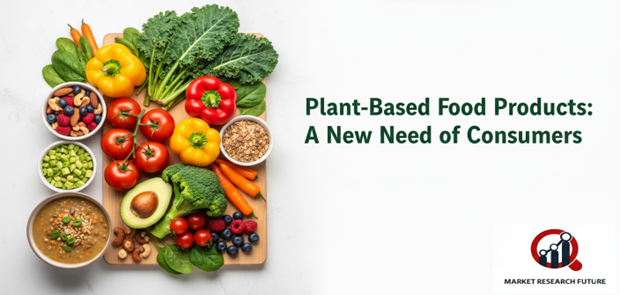Plant-Based Food Products: A New Need of Consumers

Plant Based Food Market Overview
Plant-based foods, though deeply rooted in human nutrition for centuries, have gained renewed global prominence as consumers increasingly seek healthier, ethical, and sustainable alternatives to animal-based products. The shift is not merely a dietary trend but a transformational movement driven by changing consumer psychology, environmental consciousness, and health awareness.
Modern consumers, especially post-COVID-19, are re-evaluating their food choices—prioritizing clean-label, minimally processed, and nutrient-rich options such as fruits, vegetables, grains, legumes, seeds, and nuts. With rising concerns about chronic diseases, lactose intolerance, and animal welfare, the demand for plant-based food has accelerated across global markets.
What Are Plant-Based Food Products?
Plant-based food products encompass a broad range of items derived from plants rather than animals, offering essential nutrients like protein, calcium, fiber, and antioxidants with low cholesterol and fewer calories. These products are typically categorized as:
- Plant-Based Dairy Alternatives (e.g., almond, soy, oat milk, and vegan cheese)
- Plant-Based Meat Alternatives (e.g., soy-based burgers, tofu, tempeh)
- Plant-Based Bakery & Confectionery
- Beverages (juices, teas, coffees, and plant-based energy drinks)
- Snacks and Ready-to-Eat Meals
Plant-based diets emphasize minimally processed and whole-food ingredients, aligning with rising preferences for functional nutrition and sustainable consumption.
Shifting Consumer Psychology
Consumer behavior has undergone a paradigm shift—from indulgence-based choices to purpose-driven eating. The rise of veganism, flexitarian diets, and eco-conscious lifestyles has turned plant-based consumption into both a health strategy and a moral choice.
Post-pandemic, the emphasis on immune health, ethical sourcing, and environmental impact has intensified. Internet trends reveal double-digit growth in global searches for vegan and plant-based diets, highlighting expanding awareness. Modern consumers associate plant-based diets with longevity, disease prevention, and ethical living.
Key Market Growth Drivers
1. Health and Wellness Awareness
Increasing evidence linking meat consumption with cardiovascular diseases, diabetes, and cancer is encouraging consumers to switch to plant-based diets. Studies, including those from the National Centre for Biotechnology Information (NCBI), highlight the long-term benefits of plant-forward eating patterns.
2. Ethical and Environmental Consciousness
Growing animal welfare concerns and awareness about the environmental footprint of livestock farming have made plant-based alternatives a sustainable necessity. Consumers are aligning food choices with planetary health.
3. Rising Incidence of Lifestyle Disorders
The global rise in obesity, cholesterol-related issues, lactose intolerance, and animal protein sensitivity has expanded the addressable market for plant-based products.
4. Innovation and Product Availability
Continuous product launches and R&D investment by leading companies are improving the taste, texture, and nutritional profile of plant-based foods—narrowing the gap with animal-based counterparts.
5. Influence of Global Brands
Major players such as Nestlé SA, General Mills, Premier Foods PLC, Tyson Foods Inc., and Keystone Natural Holdings are spearheading the shift by expanding product lines and scaling availability through retail and e-commerce channels.
Challenges
Despite strong growth, the market faces several challenges:
- Taste and Texture Gap: Achieving parity with meat-based products remains a challenge.
- High Production Costs: Sourcing high-quality plant-based ingredients increases prices.
- Consumer Skepticism: In some markets, traditional dietary habits hinder adoption.
- Supply Chain Complexity: Ensuring consistent quality and global supply is a logistical hurdle.
Overcoming these challenges requires technological innovation, supply chain optimization, and consumer education.
Regional Insights
- North America dominates the global market, fuelled by strong consumer awareness, large vegan population, and product availability across retail and online platforms.
- Europe is witnessing robust growth due to stringent sustainability regulations, high ethical awareness, and innovative food startups.
- Asia-Pacific is the fastest-growing market with rising disposable incomes, urbanization, and health consciousness in countries like India, China, and Japan.
- Latin America & Middle East/Africa are the emerging markets showing gradual adoption, with increasing exposure to global plant-based brands and growing health awareness.
Future Outlook
The future of the plant-based food industry lies in continuous innovation, sustainable sourcing, and consumer personalization. Advancements in food science, protein extraction, and flavor engineering will help bridge sensory gaps between plant-based and meat-based products.
Additionally, integration with digital retail platforms, AI-based product development, and eco-friendly packaging will enhance accessibility and appeal. As consumers prioritize health, sustainability, and ethical values, plant-based food products are set to become a mainstream dietary choice worldwide.
Conclusion
The global shift toward plant-based food products represents a fundamental change in how consumers view nutrition, ethics, and sustainability. Driven by rising health consciousness, environmental awareness, and innovation, the market is poised for sustained growth.
As key players focus on enhancing taste, texture, and nutritional value, plant-based foods are transitioning from niche alternatives to everyday essentials. The coming decade will mark a new era of conscious consumption, where plant-based diets stand at the forefront of a healthier and more sustainable food ecosystem.

Leave a Comment